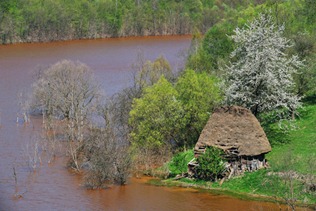More Uncompensated Environmental Damage in Nigeria
NIGERIAN TRIBUNE, November 11, 2011
 Shell must pay an initial $1 billion to begin the clean up of pollution caused by oil spills in the Niger Delta, Amnesty International and the Centre for Environment, Human Rights and Development (CEHRD) said on Thursday.
Shell must pay an initial $1 billion to begin the clean up of pollution caused by oil spills in the Niger Delta, Amnesty International and the Centre for Environment, Human Rights and Development (CEHRD) said on Thursday.
A new report by the two groups released on Thursday, looks at the ongoing devastation caused by two major oil spills which took place at Bodo, Ogoniland, in 2008, and which have never been cleaned up.
The UN Environment Programme recently found that oil pollution, over many years, had resulted in such devastation that would take more than 25 years for Ogoniland to recover from.
The UN recommended the setting up of an Environmental Restoration Fund with an initial amount of $1billion, with further funding to follow.
“Shell’s failure to promptly stop and clean up oil spills in Bodo has devastated the lives of tens of thousands of people. Bodo is a disaster that should not have happened, yet it is one due to Shell’s inaction. It is time this multi-billion dollar company owns up, cleans up and pays up,” said Aster van Kregten, Amnesty International’s researcher for Nigeria.
In 2008, two consecutive spills, caused by faults in a pipeline, resulted in thousands of barrels of oil polluting the land and creeks surrounding Bodo, a town of some 69,000 people. Both spills continued for weeks before they were stopped. No proper clean up has ever taken place.
“The situation in Bodo is symptomatic of the wider situation in the Niger Delta oil industry. The authorities simply do not control the oil companies. Shell and other oil companies have the freedom to act – or fail to act – without fear of sanction. An independent, robust and well-resourced regulator is long overdue, otherwise even more people will continue to suffer at the hands of the oil companies,” said Patrick Naagbanton, CEHRD’s coordiantor.
Shell, which recently reported profits of $ 7.2 billion from July-September, initially offered the Bodo community just 50 bags of rice, beans, sugar and tomatoes as relief for the disaster.
“The facts here are simple,” adds Patrick Naagbanton. “Two spills, both of them the company’s fault, both left to flow for weeks before being stopped, neither cleaned up although three years have passed. There can be no excuses. By any standard, this is a corporate failure.”
Nigeria’s government agencies are also strongly criticized in the report for their failure to enforce regulations. The Federal Ministry of Petroleum Resources – which is responsible for ensuring the oil industry complies with regulation – is also charged with promoting the oil industry and ensuring maximum revenues.
The Nigerian government agency responsible for oils spills – the National Oil Spill Detection and Response Agency (NOSDRA) – is under-resourced and ineffective. The agency has no independent capacity to identify oil spills and is dependent on being notified by the oil company responsible or by the affected community. [Read rest of story]


